Table of Contents
Introduction
Have you ever wanted to learn German but weren’t sure where to start? With over 130 million speakers worldwide, German opens doors to amazing opportunities in business, travel, and education. Learning German can help you visit beautiful cities like Berlin and Vienna, boost your career, or connect with German-speaking friends and family. Online German tutoring has completely changed how people learn languages. You no longer need to drive to language schools or try to fit classes into your busy schedule. Now, you can learn German from anywhere with an internet connection, at times that work best for you. But with so many online tutors and platforms available, how do you find the right one for your specific needs? That’s where this guide comes in! I’ll walk you through everything you need to know about finding your perfect online German tutor. We’ll look at what makes tutoring better than apps, how to choose the right tutor, and which platforms offer the best experience. By the end, you’ll have all the information you need to start your German learning journey with confidence.Why Learn German with an Online Tutor?
The Language Learning Spectrum: Apps vs. Courses vs. Tutors
Today, there are many ways to learn German. You might have tried language apps like Duolingo or Babbel, or maybe you’ve looked into group courses. These options can be really helpful, but they often miss something important: personalized attention. Think about it this way. Would you rather follow a one-size-fits-all program or learn in a way that truly matches your goals, your pace, and the way you learn best? Online tutoring gives you that kind of flexibility. It’s built around you, not the other way around.Personalization Benefits: Customized Curriculum and Feedback
When you work with a tutor, you get a learning plan made just for you. Are you learning German for business? Your tutor can focus on professional vocabulary and communication styles. Planning a trip to Germany? They’ll help you learn practical travel phrases. Many learners find that one-on-one tutoring gives them the space to focus on what they really need. For example, if you’re struggling with German cases like nominative, genitive, dative, or accusative, a tutor can create specific exercises to help you improve. In a group class, it’s easy to feel hesitant about asking too many questions or slowing things down, but in private lessons, you can take the time you need without pressure.Flexibility Advantages: Schedule on Your Terms, Learn from Anywhere
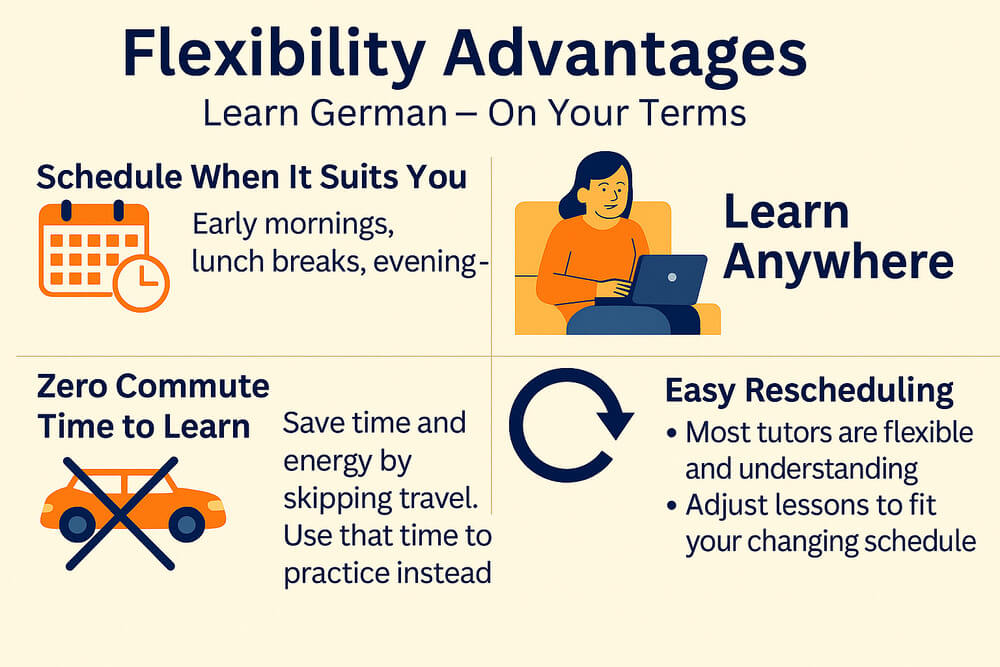
Cost Effectiveness of Private Online German Lessons
Private online German lessons may seem more expensive at first, but they often offer much greater value compared to traditional group courses. Most one-on-one lessons range from 15 to 60 US dollars per lesson, depending on the tutor’s experience.
What makes this option more effective is the personalized focus. You get lessons that match your goals and your level. You also get more chances to speak, write, ask questions, and receive direct feedback. This kind of focused support is difficult to find in a group setting.
In group classes, students usually follow a general plan that covers reading, listening, and grammar. Speaking and writing often receive less attention, especially when there are many students. While group courses might seem more affordable because they offer more hours, progress is often slower and less targeted.
With private lessons, you move at your own pace and focus on the skills that matter most to you. This makes one-on-one tutoring a smart and efficient way to improve your German.
Plus, you save money on:- Transportation costs
- Learning materials (many tutors provide digital resources)
- Time (your most valuable resource)
Real Communication Practice: Authentic Conversation with Native Speakers
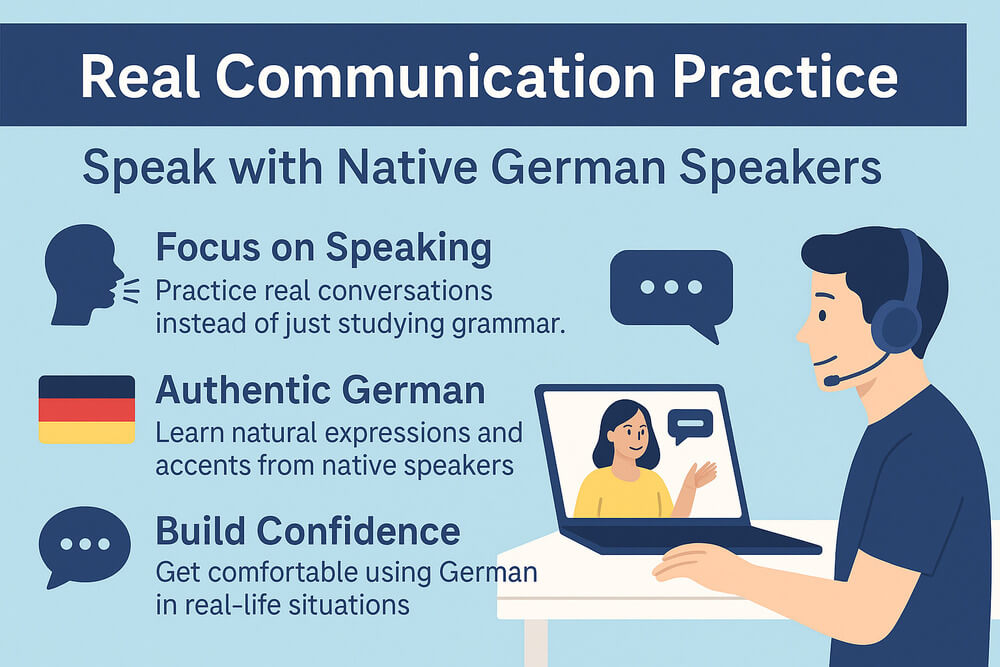
Faster Progress with an Online Private Tutor
Many learners find that private tutoring helps them make progress much faster than self-study or group courses. Instead of following a fixed program, every lesson is adapted to your needs. A tutor can quickly spot where you’re struggling and help you improve with targeted practice.
It’s common for learners to spend months using apps or trying to study on their own, only to feel stuck or unsure. But once they begin working with a tutor, they often start understanding the language more clearly and feel more confident using it in real conversations.
Accountability Factor: How Tutors Keep You Motivated and Consistent
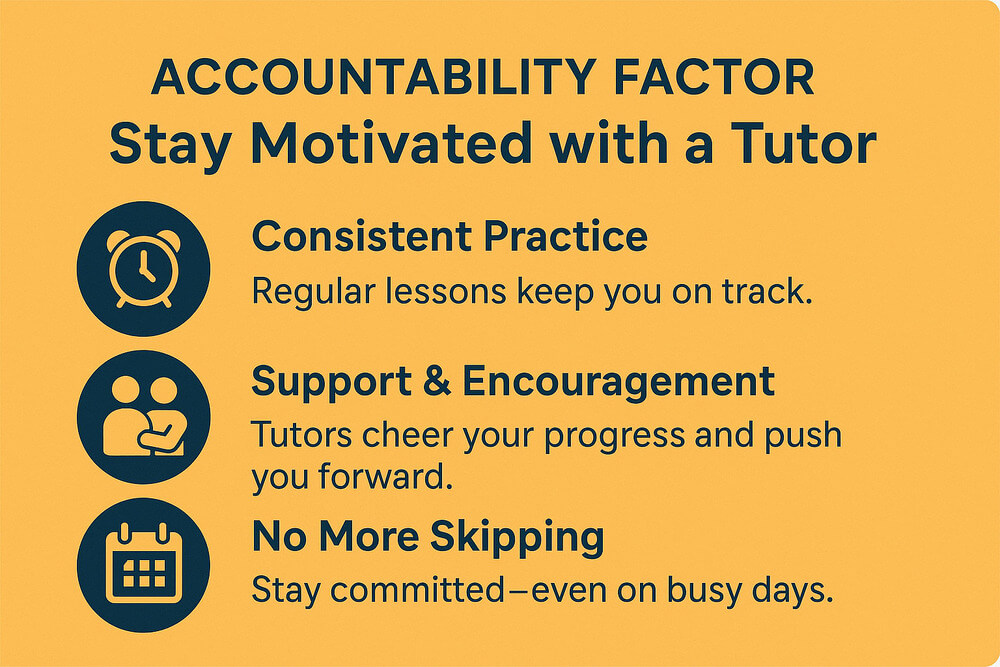
How to Choose the Right Online German Tutor
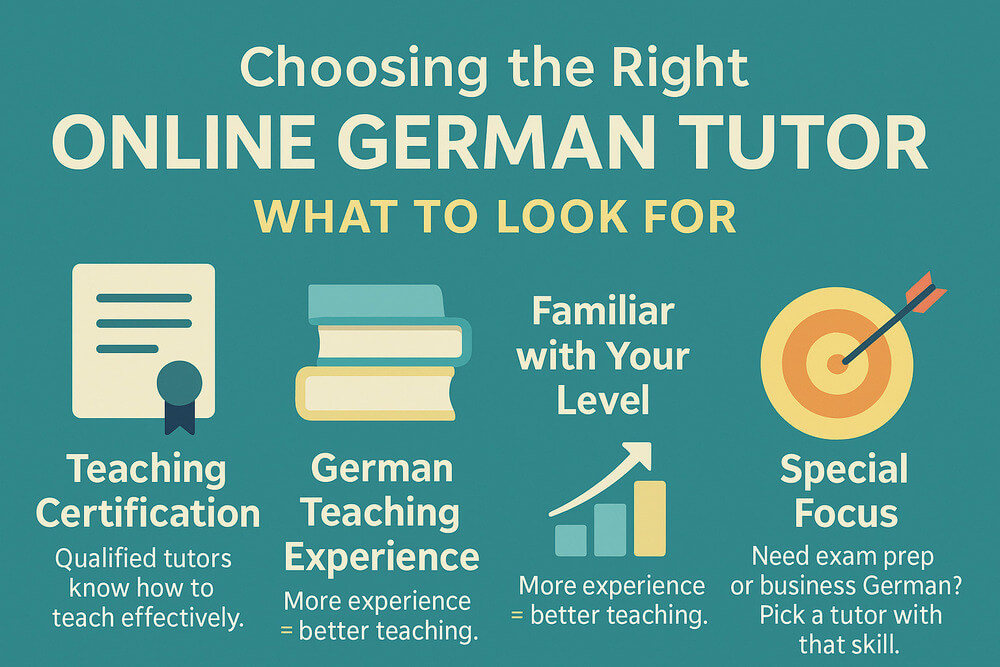
Essential Qualifications: Teaching Certifications and Experience to Look For
Not every German speaker is a trained teacher. To make steady progress, it’s important to choose a tutor with the right qualifications and experience. Here are some key things to consider:- Teaching certifications: Look for a tutor who has completed a teaching certification or holds a degree in language education. This shows they understand how to teach German effectively.
- Experience teaching German: More experience often means better teaching skills.
- Experience with your level: A tutor who regularly teaches beginners will often be better for new learners
- Specialized German: If you have a specific goal like learning German for work or passing an exam, look for a tutor who has experience in that area.
Native vs. Non-Native Debate: Pros and Cons of Each Option
Should you choose a native German speaker or a non-native teacher? Both have advantages: Native German Speakers:- Authentic pronunciation and natural expressions
- Deep cultural knowledge
- Intuitive understanding of the language
- Often better understand the challenges you face as a learner
- Can explain grammar from a learner’s perspective
- May speak your native language, which helps with explanations
Teaching Methods: Common Approaches and What Might Work for You
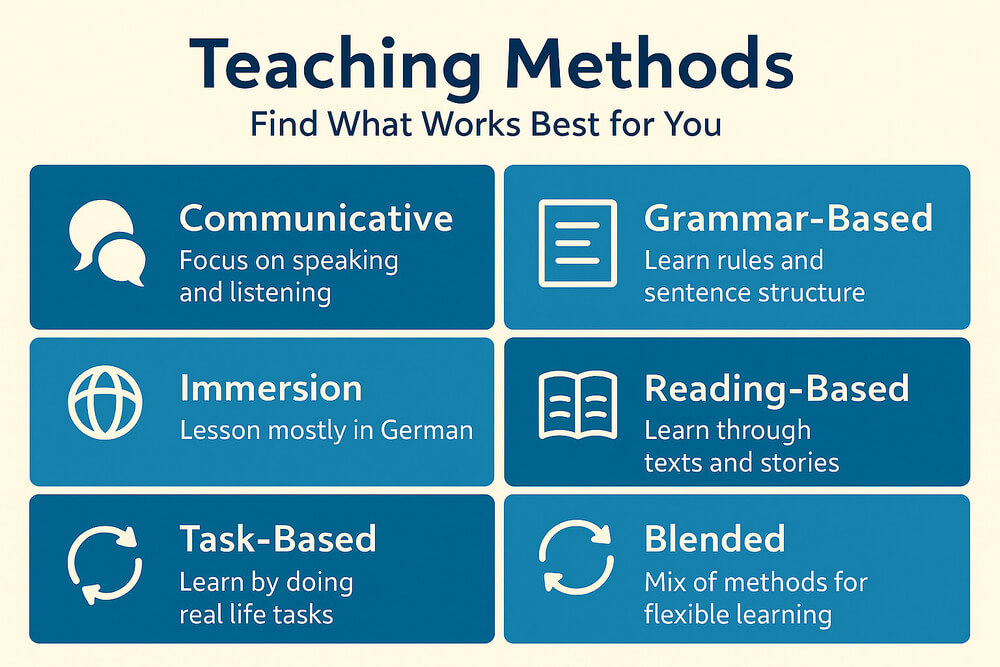
Different German tutors use different teaching methods, and the right one can make a big difference in how well you learn. Here are some of the most common approaches:
-
Communicative Approach
Focuses on building real-life conversation skills. Lessons are centered around speaking and listening to help you use German in everyday situations. -
Grammar-Based Approach
Emphasizes grammar rules and sentence structure. This is useful if you want a strong understanding of how the language works. -
Task-Based Learning
Lessons are built around completing real-world tasks like writing an email, making a phone call, or planning a trip. You learn by doing. -
Immersion Method
The tutor uses mostly or only German during the lesson. This helps you start thinking in German and get used to hearing the language in a natural way. -
Reading-Based Approach
Uses reading texts to teach vocabulary, sentence patterns, and comprehension. Great for learners who enjoy learning through stories or written materials. -
Blended Method
Combines different teaching styles based on your goals and level. A tutor might start with conversation, add grammar explanations, include reading practice, and finish with a short writing task in the same lesson. This flexible approach works well for personalized learning.
Specialization Areas: Finding Tutors for Business, Academic, or Travel German
Many tutors specialize in specific areas of German. Depending on your goals, look for tutors with expertise in:- Business German: For professional settings
- Academic German: For university studies
- Travel German: For vacations and short trips
- Exam Preparation: For official German tests like TestDaF or Goethe exams
- Conversation Practice: For improving speaking skills
- Grammar Practice: For improving grammar in German
- Writing: For writing emails or letters
Pricing Considerations: Understanding Value vs. Cost
Tutor prices vary widely, typically ranging from $15 to $60+ per lesson. While it’s tempting to choose the cheapest option, consider the value you’re getting. More experienced tutors might charge more but could help you learn faster and more effectively. On the other hand, newer tutors might offer lower rates while still providing quality instruction. Many platforms offer trial lessons at reduced prices, which is a great way to test compatibility before committing.Technical Requirements: Ensuring Smooth Online Lessons
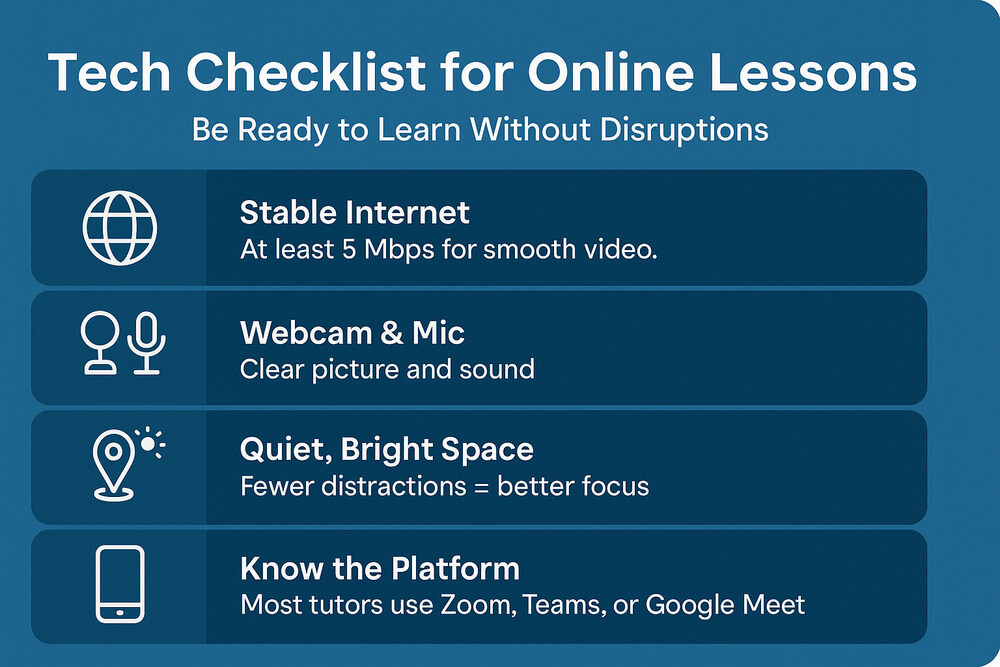
- Stable internet connection: At least 5 Mbps download/upload speed
- Working webcam and microphone: For clear communication
- Quiet, well-lit space: To minimize distractions
- Screen large enough to see learning materials: Laptop, tablet, or desktop (phones are generally too small)
Trial Lessons: How to Evaluate Compatibility and Teaching Style
Most tutoring platforms offer discounted or free trial lessons. Use these to evaluate:- Personal connection: Do you feel comfortable with the tutor?
- Teaching style: Does their approach match your learning preferences?
- Clarity of explanations: Can you understand their instructions?
- Lesson structure: Is the session organized and productive?
- Responsiveness: Do they adjust to your needs?
Red Flags to Watch For: What to Avoid When Selecting a Tutor
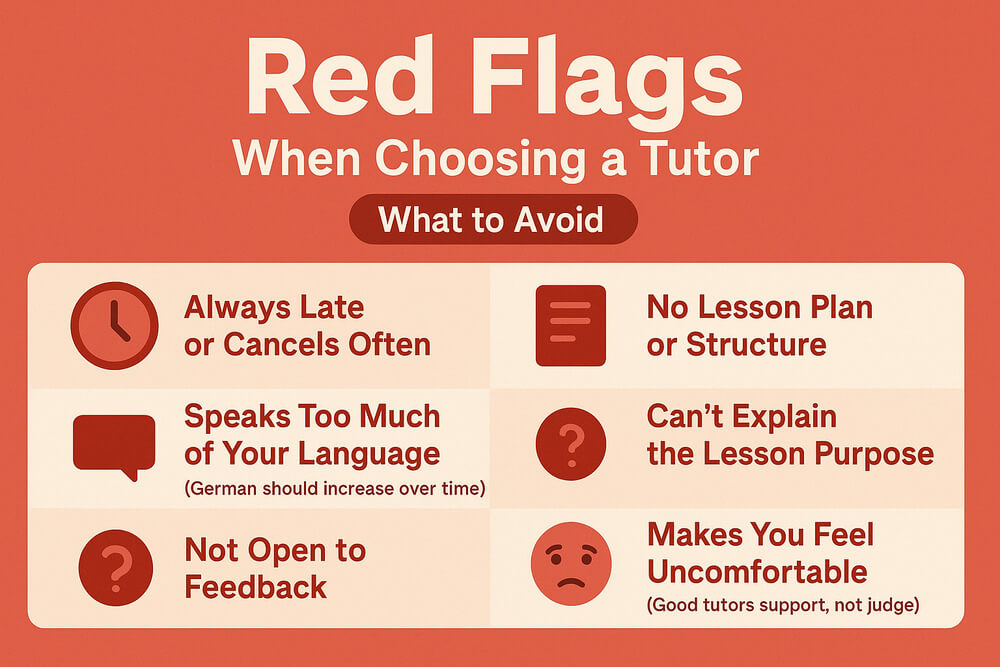
- Is consistently late or reschedules frequently
- Doesn’t have any lesson plan
- Speaks mostly in your native language during lessons (this can be fine at the beginning or when explaining grammar, but over time, you should hear and speak more German to build fluency)
- Can’t explain why they’re teaching certain material
- Isn’t open to feedback or adjusting to your needs
- Makes you feel uncomfortable or judged when you make mistakes
Top Online German Tutoring Platforms Compared
Comprehensive Comparison Table: Features, Pricing, Pros and Cons
Let’s look at the main platforms where you can find German tutors:| Platform | Price Range | Range of Tutors | Trial Lessons | Cancellation Policy | Unique Features | Best For |
|---|---|---|---|---|---|---|
| Preply | $20-50/hr | Many tutors | Yes, discounted | 12 hours notice | Huge tutor selection | Budget-conscious learners |
| iTalki | $15-50/hr | Many tutors | Yes, discounted | 24 hours notice | Community features, many tutors | Language exchange seekers |
| LanguaTalk | $25-60hr | Smaller selection of tutors | Yes, 30-min free | 24 hours notice | No commission fees | Quality-focused learners |
| Superprof | $15-45/hr | Many tutors | Varies by tutor | normally 24 hours notice | Local tutor options | Flexible learning options |
| Wyzant | $35-75/hr | Many tutors | Yes, discounted | 24 hours notice | Money-back guarantee | US-based learners |
| Lingoda | $10-15/class | Many tutors | Free 7-day trial | 72 hours notice | Group classes | Social learners |
| How To Study German | $45/hr ($15 trial) | Single expert native German tutor | Yes, 30-min for $15 | 12 hours notice | Specialized German focus | Serious German learners, quality-focused learners |
Preply: Platform Overview, Strengths, Weaknesses
Preply offers one of the largest selections of German tutors, with prices starting at $20 per hour and going up to $60 for more experienced teachers. Strengths:- Huge variety of tutors at different price points
- Easy-to-use booking system and calendar
- Integrated video platform and lesson space
- Tutor ratings and detailed reviews
- High commission from tutors (18-33%) which can affect tutor retention
- Quality varies widely among tutors
- Limited verification of tutor credentials
- Some tutors lack structured teaching plans
- Difficult to decide which teacher to take
- Preply uses a monthly subscribtion model
iTalki: Platform Overview, Strengths, Weaknesses
iTalki is one of the oldest and most established language tutoring platforms, with both professional teachers and community tutors. Strengths:- Clear distinction between certified teachers and conversational tutors
- Strong community features (language exchange, discussion forums)
- Detailed tutor profiles with video introductions
- Specialized lesson types (exam prep, business German, etc.)
- Interface can be overwhelming for beginners
- Payment system requires purchasing credits first
- Scheduling across time zones can be confusing
- Limited support if issues arise with tutors
LanguaTalk: Platform Overview, Strengths, Weaknesses
LanguaTalk focuses on quality over quantity, with a smaller but more carefully vetted selection of tutors. Strengths:- Rigorous tutor vetting process (only 10% of applicants accepted)
- 30-minute free trial lessons with multiple tutors
- Lower commission rates, meaning tutors earn more
- Simple, user-friendly platform
- Fewer tutors to choose from
- Limited availability during certain time zones
- Newer platform with fewer reviews
- Slightly higher average prices than some competitors
Superprof: Platform Overview, Strengths, Weaknesses
Superprof connects students with both online and local tutors, offering flexibility in learning formats. Strengths:- Option for in-person lessons in some locations
- One-time platform fee rather than ongoing commissions
- Direct contact with tutors after initial connection
- Wide range of teaching specialties
- Limited verification of tutor qualifications
- Inconsistent trial lesson policies
- Communication happens outside the platform
- Variable teaching quality
- Students pay a monthly subscription to contact tutors. If they don’t cancel it, the subscription renews automatically and they continue to be charged each month.
Wyzant: Platform Overview, Strengths, Weaknesses
Wyzant is popular in the US market and offers a satisfaction guarantee for your first lesson. Strengths:- Thorough background checks for tutors
- Good satisfaction guarantee policy
- Integrated lessons platform with shared whiteboard
- Detailed tutor profiles and credentials
- Higher average prices than international platforms
- Smaller selection of German tutors
- US-focused, which affects availability in other time zones
- 25% service fee adds to costs
Lingoda: Platform Overview, Strengths, Weaknesses
Lingoda offers both private and small group classes with professional teachers. Strengths:- Structured curriculum aligned with CEFR levels
- Professional teachers
- Option to switch between private and group classes
- Regular progress assessments
- Less flexibility in lesson content (follows set curriculum)
- More expensive for truly private lessons
- Subscription model rather than pay-per-lesson
- Less personalization than independent tutors
- 72h cancelation policy
- Teachers can often change, which can be confusing
How To Study German: Our Specialized Approach
At How To Study German, you don’t scroll through hundreds (or thousands) of tutor profiles. You work directly with one experienced teacher who knows how to help you reach your goals. Strengths:- Focused entirely on teaching German
- Personalized learning plans based on your goals and level
- Expert German native teacher (Niko) with more 7 years of experience and more than 5000 lessons taught
- Skilled in working with professionals such as doctors, managers, and software developers
- Lessons focus on real situations at work and everyday communication in the workplace
- Proven success in preparing students for exams such as Goethe, Telc, TestDaF, DSH, ÖSD, SDS, and medical German tests
- Clear and effective grammar explanations in both English and German
- Personalized learning plans based on your goals
- Strong testimonials from learners who made real progress
- Only one tutor, so time slots can be limited
- More expensive than budget platforms, but with higher quality and focus
Platform Selection Guide: Which Platform Suits Different Learning Needs
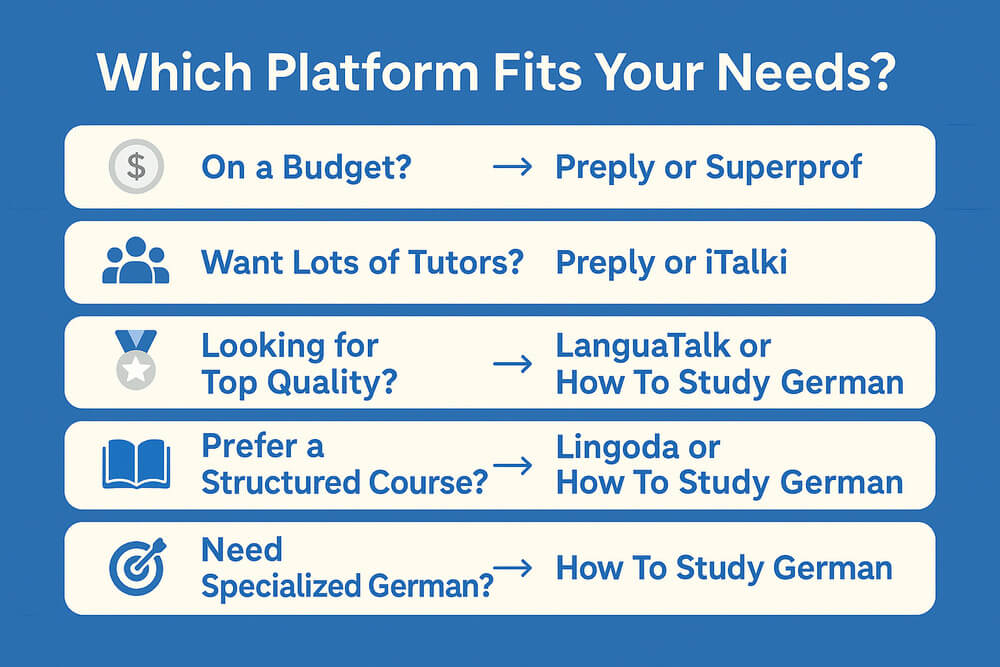
- For budget-conscious learners: Preply offers competitive pricing options
- For maximum tutor selection: Preply or iTalki
- For highest tutor quality: LanguaTalk or How To Study German
- For structured curriculum: Lingoda or How To Study German
- For specialized German learning: How To Study German
Hidden Costs Analysis: Understanding the True Cost of Lessons
When comparing platforms, look beyond the hourly rate to understand the true cost:- Platform fees: Some platforms charge extra fees
- Package requirements: Some require purchasing multiple lessons
- Cancellation policies: What happens if you need to reschedule?
- Learning materials: Are they included or extra?
- Trial lesson limitations: Are they shorter or restricted?
Booking and Scheduling: Flexibility Comparison
Scheduling flexibility varies across platforms:- Preply: 12-hour cancellation policy, calendar blocking, monthly subscription
- iTalki: 24-hour cancellation
- LanguaTalk: 24-hour cancellation policy
- Superprof: 24-hour cancellation policy (tutor-specific enforcement), subscription-based model
- Wyzant: 24-hour cancellation policy
- Lingoda: 72-hour cancellation, subscription-based model
- How To Study German: 12-hour cancellation policy, flexible booking without subscription
Payment Security: Policies and Protections
When paying for online lessons, security and fairness are important. Here are key points to consider:
-
Most platforms process payments securely through trusted systems like Stripe or major credit cards
-
Check whether the platform offers refunds or credit if a lesson doesn’t meet expectations
-
Review the platform’s dispute resolution process in case of any issues
-
Use payment methods with strong buyer protection, such as credit cards or Stripe-powered checkouts
Learning German for Specific Goals
Business German: Professional Vocabulary and Communication

Learning German for business can open new career opportunities in German-speaking countries and international companies.
Effective Business German lessons should include:
-
Professional vocabulary and terminology
- Work-related communication, such as meetings, phone calls, and daily workplace interactions
-
Formal writing and email communication
-
Business etiquette and cultural expectations
-
Presentation and negotiation practice
-
Industry-specific language, depending on your field
Academic German: University-Level Language Skills
If you’re planning to study at a German university, you’ll need academic language skills. Academic German tutoring should cover:- Academic writing and citation styles
- Research vocabulary and terminology
- Listening comprehension for lectures
- Discussion and presentation skills
- Technical reading comprehension
Travel and Everyday German: Practical Conversational Skills
For travel purposes, focus on practical skills rather than perfect grammar. Effective travel German tutoring includes:- Survival phrases for transportation, accommodation, and dining
- Handling basic emergencies and problems
- Cultural norms and social customs
- Practical listening comprehension
- Reading signs, menus, and schedules
Exam Preparation: TestDaF, DSH, Goethe Zertifikat Strategies
Official German exams require focused and structured preparation. A good exam tutor knows what the test expects and helps you build the skills to pass with confidence.
Effective exam preparation includes:
-
A clear understanding of the exam format and requirements
-
Practice focused on each section of the exam: reading, writing, listening, and speaking
- Essential grammar preparation to meet exam requirements and avoid common mistakes
-
Test-taking strategies and time management
-
Mock exams under realistic conditions
-
Feedback based on official grading criteria
Need help preparing for a German exam? Book a trial lesson and get a clear plan based on your exam and level.
Cultural Integration: Beyond Language to Cultural Competence
Language is just one part of integration into German-speaking society. Cultural integration tutoring includes:- Cultural norms, values, and taboos
- Social customs and expectations
- Regional differences and local traditions
- Current events and popular culture
- Practical aspects of daily life
Finding Specialized Tutors: How to Identify Tutors with Relevant Expertise
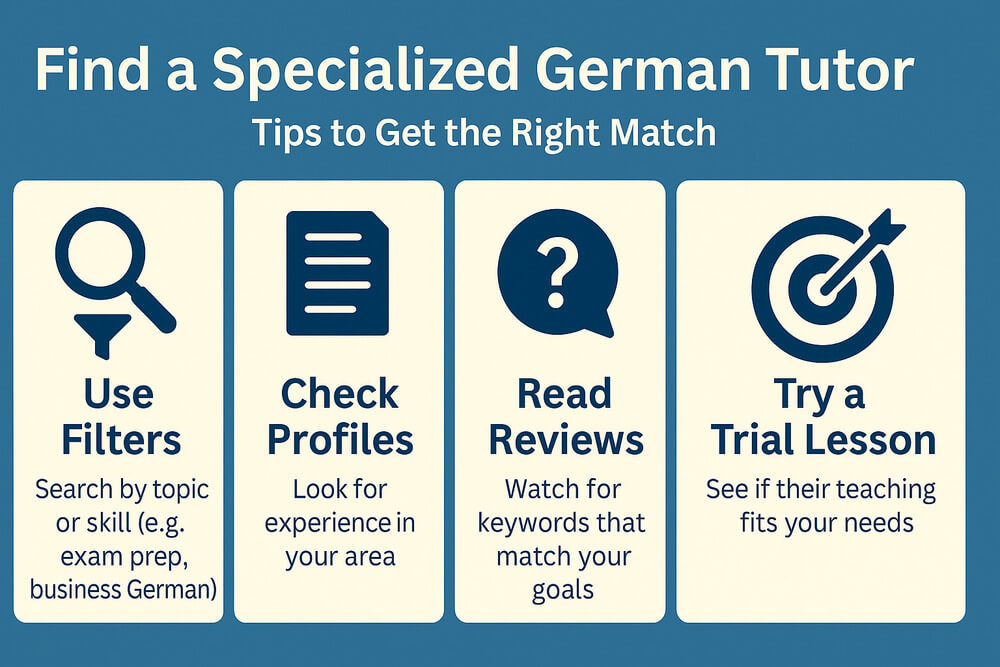
If you’re looking for a tutor with expertise in a specific area, here are a few things to keep in mind:
-
Use platform filters to narrow down by specialization
-
Read tutor profiles carefully to check for relevant background and experience
-
Look for keywords in student reviews that match your learning goals
-
Ask direct questions about their experience in your area of interest
-
Book a trial lesson to see how well the tutor meets your specific needs
At How To Study German, Niko offers focused instruction in several areas, including business German, academic exam preparation, and cultural integration. With more than 7 years of teaching experience, he can adjust the lessons to match your personal learning goals and professional context.
The German Language Learning Journey
CEFR Levels Explained: From A1 Beginner to C2 Mastery
The Common European Framework of Reference (CEFR) divides language proficiency into six levels: A1 (Beginner)- Can understand and use familiar everyday expressions
- Can introduce themselves and ask/answer basic questions
- Typical time: 80-100 hours of study
- Can communicate in simple, routine situations
- Can describe in simple terms aspects of their background
- Typical time: additional 90-100 hours
- Can deal with most situations while traveling
- Can produce simple connected text on familiar topics
- Typical time: additional 90-100 hours
- Can interact with a degree of fluency with native speakers
- Can produce clear, detailed text on a wide range of subjects
- Typical time: additional 100 hours
- Can use language flexibly and effectively for social and professional purposes
- Can produce clear, well-structured, detailed text
- Typical time: additional 100-150 hours
- Can understand virtually everything heard or read
- Can express themselves spontaneously and precisely
- Typical time: additional 150-200 hours
Note: These are average estimates based on guided learning. Actual progress depends on your native language, study habits, and previous experience.
Learners who take private lessons, especially one-on-one online tutoring, usually make faster progress. With structured guidance, personalized support, and focused lessons, many students reach each level in less time than in traditional group classes.
Realistic Timelines: What to Expect at Each Stage
Setting realistic expectations helps maintain motivation: First Month (20-30 hours)- Basic greetings and introductions
- Simple questions and answers
- Numbers, colors, and common objects
- Present tense of regular verbs
- Simple conversations about daily life
- Basic sentence construction
- Beginning grammar concepts
- Expanded vocabulary for daily needs
- More comfortable conversations
- Past tense and future tense basics
- Ability to express opinions and preferences
- Reading simple authentic texts
- Comfortable in most everyday situations
- Good grasp of main grammar concepts
- Ability to discuss various topics
- Can follow native content with some support
Milestone Achievements: Concrete Goals for Each Level
Understanding what you’ll actually be able to do at each level helps keep you motivated and focused. Here are some common goals learners achieve from A1 to C2. A1 Milestones:- Introduce yourself and others
- Order food and drinks
- Ask for and understand directions
- Complete basic forms with personal information
- Make and respond to invitations
- Talk about your hobbies and interests
- Understand simple announcements
- Tell simple stories about past events
- Explain problems and request assistance
- Participate in conversations on familiar topics
- Write personal letters describing experiences
- Understand main points of clear standard speech
- Present and defend opinions in discussion
- Understand extended speech and lectures
- Read newspaper articles and contemporary prose
- Write detailed text on a wide range of subjects
- Express ideas fluently and spontaneously
- Use language effectively in professional and academic settings
- Understand long, complex texts and implicit meanings
- Understand virtually everything heard or read with ease
- Summarize information from different sources coherently
- Express yourself precisely, even in nuanced or abstract discussions
Want help reaching your next level? Book a trial lesson and start working toward your goals with expert guidance.
Common Grammar Challenges in German – And How Tutors Help You Overcome Them
Learning German can be difficult, especially because of grammar rules that many learners find confusing. The most common problems include German articles, the case system, word order, tenses, and long compound words. A private tutor can help you understand these topics faster and more clearly.
1. German Articles: der, die, das
The gender system in German is one of the first problems students face.
-
Many nouns use different articles: der, die, or das.
-
These articles do not follow logical rules in most cases.
A tutor helps by:
-
Teaching memory tricks and patterns
-
Creating practice exercises to repeat and remember
-
Giving immediate corrections, so mistakes don’t become habits
Learn more: German Articles – der, die, das
2. German Cases: Nominative, Accusative, Dative, Genitive
Cases change the article and form of a word depending on the sentence role. Many learners struggle with this.
Tutors make the case system easier by:
-
Using simple examples from daily life
-
Showing charts and visual tools
-
Giving targeted sentence practice
Full overview: German cases explained
Read more about each case:
3. Word Order
German word order often confuses learners because it is different from English. The verb usually comes second, and sometimes verbs move to the end.
Tutors help by:
-
Explaining the position of the verb in different sentence types
-
Showing how subordinating conjunctions push verbs to the end
-
Practicing questions, and imperatives
-
Breaking down long sentences into clear parts
-
Creating drills to master sentence structure step by step
See guide: German Word Order
4. German Tenses
Tenses in German can be tricky, especially when choosing between Perfekt and Präteritum.
A tutor supports you by:
-
Teaching clear timelines for tense usage
-
Providing comparison exercises
-
Focusing on the tenses you need most in daily life
Learn more: German Tenses – Easily Explained
Study Frequency: Optimal Lesson Schedules for Different Goals
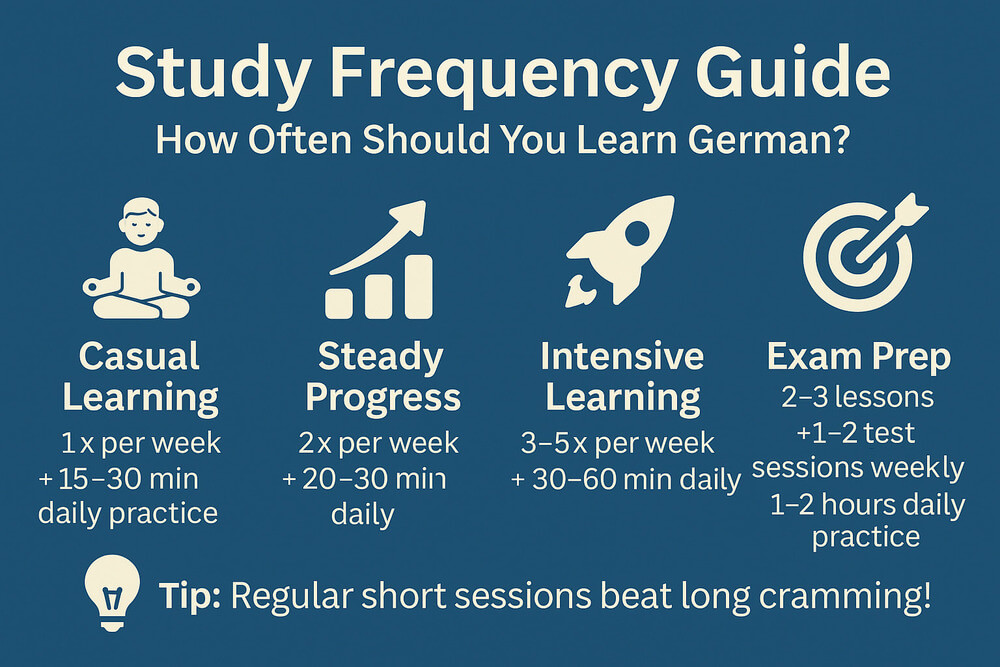
- 1 lesson per week (45-60 minutes)
- 15-30 minutes of daily practice between lessons
- 2 lessons per week (45-60 minutes each)
- 20-30 minutes of daily practice
- 3-5 lessons per week
- 30-60 minutes of daily practice
- 2-3 regular lessons plus 1-2 exam-specific sessions weekly
- 1-2 hours of daily practice
Supplementary Tools That Improve Your German Lessons
A great tutor supports you not just during the session, but also between lessons. With the right tools, you can build vocabulary, practice grammar, improve your listening skills, and strengthen your speaking abilities. Below are recommended resources—both free and effective—that can help you make faster progress.
Vocabulary Practice
Expanding your vocabulary is key to fluency. These tools help you review and memorize new words effectively:
-
Use Anki or Quizlet to create flashcards with spaced repetition
-
Duolingo is a fun app for practicing beginner vocabulary daily
-
Read simplified news at Nachrichtenleicht, which includes audio and written texts
-
Practice vocabulary for free with our German vocabulary quizzes: created for beginners to advanced learners.
Grammar Support
German grammar can feel overwhelming without regular practice. These resources help explain rules clearly and give you exercises to reinforce them:
-
Read clear explanations in our German grammar article collection: each guide focuses on one grammar point with simple rules and examples.
-
Grammar books with answer keys are great for offline practice
-
Grammar videos on YouTube break down tricky concepts in a visual format
-
Test yourself with our German grammar quizzes.
Listening Practice
Listening improves your understanding of natural speech and helps you get used to German pronunciation and rhythm.
-
Watch interviews with subtitles on the Easy German YouTube channel
-
Listen to German music and read along with the lyrics
-
Explore Nachrichtenleicht for weekly news in slow, clear German with audio and text
-
Add German audiobooks or podcasts to your daily routine
Speaking Practice Resources
You can improve your speaking skills between lessons using simple tools and activities:
-
Use language exchange apps like Tandem to practice with real people
-
Record yourself answering common questions to improve pronunciation and fluency
-
Use AI chatbots or voice input apps to simulate conversation
-
Read short texts out loud and shadow native speakers from podcasts or YouTube videos
Progress Tracking: How to Measure Your Advancement
Measuring progress keeps you motivated: Regular assessments:- Periodic level tests
- Recording speaking samples to compare over time
- Tracking vocabulary acquisition
- Reading books or articles at your target level
- Having conversations with native speakers
- Completing real-world tasks in German
- Document new phrases and expressions
- Note situations where you successfully used German
- Record questions for your next tutoring session
Strategies That Help German Learners Succeed
Many successful German learners follow similar strategies that make their progress faster and more effective. Here are key approaches that work:
-
Learn consistently, not intensively: Short, regular study sessions are more effective than long, infrequent ones.
-
Set clear goals with deadlines: Having specific targets keeps your learning focused and adds motivation.
-
Use German in real life: Applying German in daily situations helps reinforce what you’ve learned in lessons.
-
Practice all four skills: Reading, writing, listening, and speaking should all be part of your routine.
-
Get regular feedback: Personalized corrections and progress check-ins help you stay on track and adjust when needed.
Tutor Selection Criteria: How to Choose the Right German Tutor
Some successful German learners try different tutors before finding the one that fits best. These are the things they pay attention to:
-
They choose tutors who match their goal, like learning German for work, exams, or family life.
-
They pick a teaching style that suits them—some want clear structure, others prefer relaxed conversation.
-
They check if the tutor is available at times that work for their schedule.
-
They want clear communication, so they always know what they’re working on and how they’re doing.
-
They like when tutors adjust lessons, especially if something isn’t working or they need a different approach.
Long-Term Outcomes: Career, Personal, and Lifestyle Benefits
Learning German offers more than just language skills. Many learners also experience lasting benefits in their career, education, personal life, and daily experiences.
Career Benefits
-
Learners receive promotions or international job offers.
-
They earn more by using bilingual skills at work.
-
They join professional networks in German-speaking industries.
Educational Success
-
Students gain admission to top German universities.
-
Some receive scholarships for international study programs.
-
They succeed in academic programs taught in German.
Personal Growth
-
Learners develop a broader worldview and cultural understanding.
-
They form new friendships and connections across countries.
-
They build more confidence in international situations.
Lifestyle Improvements
-
Travelers enjoy deeper experiences in German-speaking countries.
-
Learners appreciate German films, books, and music more fully.
-
Many feel a strong sense of progress and achievement.
Expert Tips for Maximizing Your Online German Tutoring
Pre-Session Preparation: Getting the Most from Each Lesson
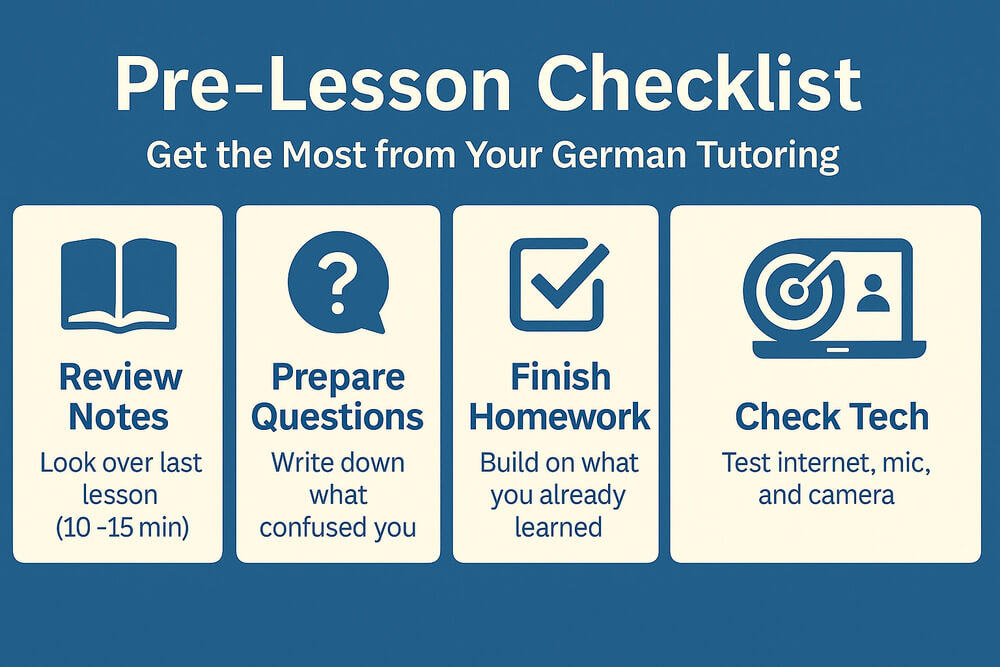
- Review previous material: Spend 10-15 minutes before each lesson reviewing notes from the previous session
- Prepare questions: Note down specific questions or challenges from your practice
- Complete homework: Finish assigned tasks to build on previous learning
- Set mini-goals: Decide what you want to accomplish in each session
- Check technical setup: Test your audio, video, and internet connection before lessons
Effective Note-Taking: Capturing and Retaining Information
Develop a note-taking system that works for you:- Cornell method: Divide your page into sections for notes, key points, and summary
- Color coding: Use different colors for vocabulary, grammar rules, and cultural notes
- Voice recording: Ask your tutor if you can record explanations for later review
- Digital tools: Apps like OneNote or Notion can organize language learning notes
- Post-session review: Spend 5-10 minutes after each lesson organizing your notes
Between-Lesson Practice: Maintaining Momentum
The time between lessons is important for progress:- Daily micro-practice: Even 10-15 minutes daily is better than one long weekly session
- Spaced repetition: Review vocabulary using apps like Anki or Quizlet
- Varied input: Listen to German podcasts, watch videos, read articles
- Speaking practice: Record yourself speaking or use language exchange apps
- Real-world application: Use German in your daily life (supermarket, shopping lists, journal)
Technology Optimization: Tools that Enhance Online Learning
Make technology work for you:- Shared documents: Use Google Docs for collaborative writing practice
- Screen sharing: Share articles or exercises during lessons
- Digital flashcards: Create shared decks with your tutor
- Chat functions: Use text chat for spelling clarification
- Video recording: Record sessions (with permission) for later review
Goal Setting and Progress Tracking: Measuring Advancement
Set clear goals and track your progress:- SMART goals: Specific, Measurable, Achievable, Relevant, Time-bound
- Learning journal: Document your progress and challenges
- Progress tests: Take periodic assessments to measure improvement
- Skill-specific goals: Target reading, writing, speaking, and listening separately
- Celebrate milestones: Acknowledge and reward your achievements
Common Pitfalls: Mistakes to Avoid in Your Learning Journey
Watch out for these common mistakes:- Irregular practice: Consistency is key: short daily practice beats occasional cramming
- Passive learning: Actively engage with the language instead of just listening
- Fear of mistakes: Embrace errors as learning opportunities
- Translation dependence: Try to think in German rather than constantly translating
- Ignoring pronunciation: Focus on correct pronunciation from the beginning
- Neglecting speaking practice: Speaking is often the most neglected but most important skill
Maintaining Motivation: Staying Engaged Long-Term
Keep your motivation strong with these strategies:- Connect with your purpose: Remind yourself why you’re learning German
- Find German media you enjoy: Music, TV shows, podcasts, or books
- Join language communities: Connect with other learners for support
- Set rewards: Celebrate achievements with meaningful rewards
- Track your progress: Keep a record of how far you’ve come
- Vary your learning activities: Mix up your routine to keep things fresh
Conclusion and Next Steps
Finding the right online German tutor can transform your language learning journey. With personalized attention, flexible scheduling, and tailored curriculum, online tutoring offers advantages that self-study apps and traditional classes simply can’t match. As we’ve seen throughout this guide, the key steps to success include:- Identifying your specific goals and learning needs
- Researching platforms and comparing options
- Evaluating tutors based on qualifications and teaching style
- Taking advantage of trial lessons to find the right match
- Committing to regular practice between lessons
- Setting clear milestones and tracking progress
FAQ
How much do online German tutors typically charge?
Online German tutor rates vary based on experience, qualifications, and the platform you use:- Budget options: $15-25 per hour
- Mid-range tutors: $25-40 per hour
- Premium tutors: $40-60+ per hour
How many lessons per week should I take?
The ideal number of lessons depends on your goals, budget, and availability:- Casual learning: 1 lesson per week
- Steady progress: 2-3 lessons per week
- Intensive learning: 3-5 lessons per week
Can I become fluent solely through online tutoring?
Yes, you can become fluent through online tutoring if you:- Work with a qualified tutor who provides structured learning
- Practice consistently between lessons
- Supplement tutoring with other input (reading, listening, etc.)
- Actively use the language in real-life situations when possible
- Maintain long-term commitment to learning
What’s the difference between a German teacher and a tutor?
While the terms are often used interchangeably, there are some general differences:
-
Teachers usually have formal teaching qualifications and often work in schools or language programs. They follow structured curricula and help students prepare for exams.
-
Tutors often teach one-on-one or in small groups. They focus on specific goals or problem areas and may adjust their lessons based on what the student needs. Many tutors also have formal teaching certificates or classroom experience.
Both can be effective, depending on how you prefer to learn.
How do I verify a tutor’s qualifications?
To verify a tutor’s qualifications:- Ask about their educational background and certifications
- Request proof of qualifications if not displayed on their profile
- Check reviews and ratings from previous students
- Look for demonstration videos or sample lessons
- Ask specific questions about their teaching experience and methods
- Use a trial lesson to assess their teaching ability firsthand
What technical equipment do I need for effective lessons?
For effective online German lessons, you need:- Reliable internet connection: At least 5 Mbps download/upload speed
- Computer or tablet: With webcam and microphone (avoid using smartphones for full lessons)
- Headphones: Preferably with an integrated microphone for clear audio
- Quiet, well-lit space: Free from distractions
- Video conferencing software: Such as Zoom, Skype, or Google Meet
- Optional: External webcam for better video quality
What happens if I’m not satisfied with my tutor?
If you’re not satisfied with your tutor:- Communicate your concerns directly with the tutor first: they may be able to adjust their teaching style
- Check the platform’s policies regarding tutor changes or refunds
- Try a different tutor
- If necessary, seek a refund according to the platform’s policies
- Leave constructive feedback to help the tutor improve and inform other students
How do I handle timezone differences with international tutors?
To manage timezone differences:- Use tools like World Time Buddy or The Time Zone Converter to check times
- Be clear about which timezone you’re referring to when scheduling
- Consider adding both timezones to your phone or computer clock
- Set up calendar reminders that automatically adjust for timezone changes
- Be flexible and consider early morning or evening sessions if working with tutors in very different timezones
- Confirm lesson times in writing to avoid misunderstandings
Are group lessons a cost-effective alternative?
Group lessons can be cost-effective but come with trade-offs: Advantages:- Lower cost per hour
- Opportunity to practice with peers
- Social learning environment
- Exposure to different questions and perspectives
- Less individual attention and speaking time
- Pace may be too fast or too slow for your needs
- Less customization of content
- Scheduling may be less flexible
How do I prepare for my first lesson?
To prepare for your first lesson with a new tutor:- Clarify your goals: Think about what you want to achieve with German lessons
- Assess your current level: Consider what German you already know, if any
- Prepare questions: Write down any specific questions you have
- Test technology: Ensure your internet, camera, and microphone work properly
- Be ready to discuss: Your learning style, schedule, and expectations
- Be honest: About your strengths, weaknesses, and time commitment

